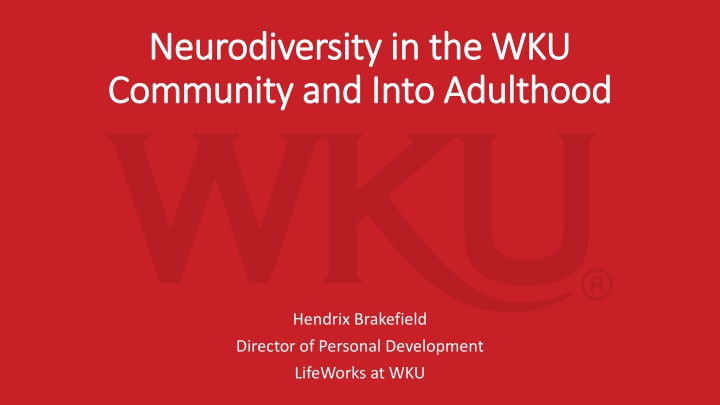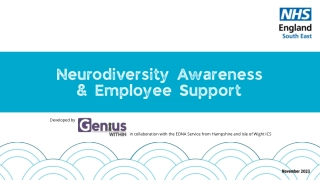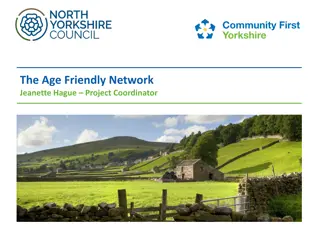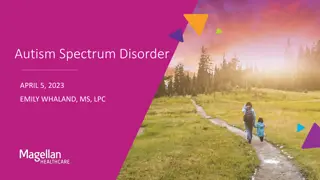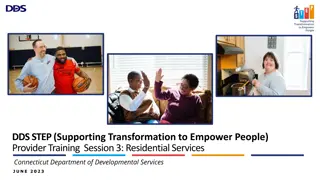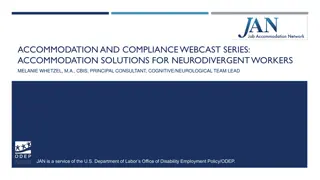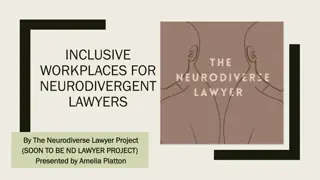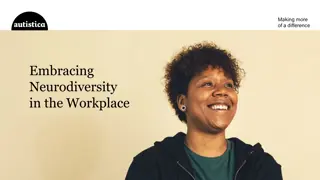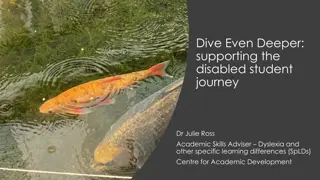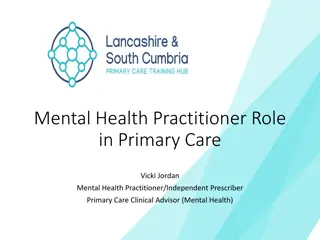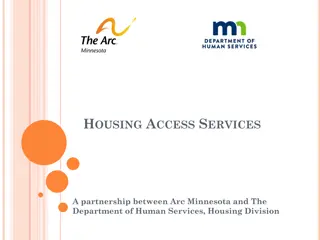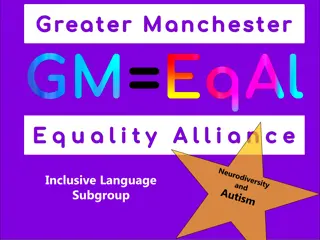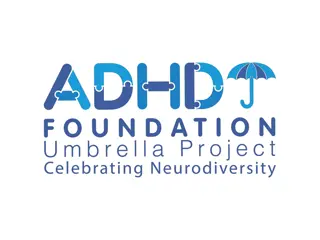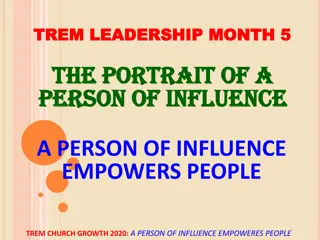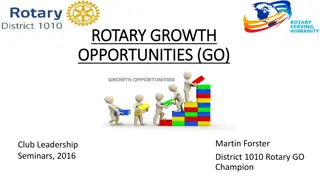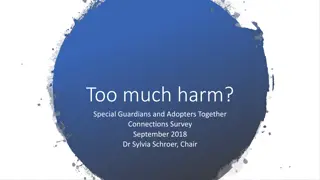Embracing Neurodiversity: Understanding, Supporting, and Empowering Individuals
Explore the concept of neurodiversity through insights from professionals working in the field. Gain a deeper understanding of the diverse experiences and challenges faced by neurodivergent individuals in various settings. Discover the importance of trauma-informed care, positive impacts, and the unique perspectives that shape the neurodiversity conversation. Dive into discussions on neurocognitive abilities, relationships, environment preferences, and the impact of societal norms on individuals across the spectrum.
Download Presentation

Please find below an Image/Link to download the presentation.
The content on the website is provided AS IS for your information and personal use only. It may not be sold, licensed, or shared on other websites without obtaining consent from the author.If you encounter any issues during the download, it is possible that the publisher has removed the file from their server.
You are allowed to download the files provided on this website for personal or commercial use, subject to the condition that they are used lawfully. All files are the property of their respective owners.
The content on the website is provided AS IS for your information and personal use only. It may not be sold, licensed, or shared on other websites without obtaining consent from the author.
E N D
Presentation Transcript
Neurodiversity in the WKU Neurodiversity in the WKU Community and Into Adulthood Community and Into Adulthood Hendrix Brakefield Director of Personal Development LifeWorks at WKU
Who has ever Felt anxious about an upcoming meeting that you weren t sure what the topic would be? Skipped out on scheduled plans because you didn t know who would be there? Felt misunderstood when trying to explain your thoughts on a topic or how you felt about something? Had your day ruined by last minute changes in plans or details? Disliked a physical environment due to lights, sounds, smells, layout, etc? Felt anxious about making relationships in a new setting?
My Background My Background Kelly Autism Program Self-Contained Special Education Teacher Recreation Director at a Residential School Director of Personal Development for LifeWorks at WKU Supported individuals ages 5-95 Supported disabilities across the spectrum
Neurodiversity Neurodiversity The concept that all humans vary in our neurocognitive abilities. Neurodiversity is not a medical term or diagnosis. Represents an umbrella of individuals. Neurodivergent vs Neurotypical
If youve met one person with autism, you ve met one person with autism.
Positive Impacts Positive Impacts Loyal Honest Empathetic Creative Focused REAL
Trauma Informed Care Trauma Informed Care Many neurodivergent individuals have had negative experiences in formalized environments. They ve been forced to conform to a system that works for others. Norms and Preferences Medical Model vs Social Model Masking Disclosure Every interaction is a chance to empower. Comfort vs Control
Observed Challenges Observed Challenges Overestimating difficulty Overly confident or lacking confidence Hypersensitive to discomfort Hypersensitive to frustrations Time management Processing time for changes or appearance of change Asking questions Requesting modelling History of being treated less cognitively capable
Sensory Sensitivities in School or Work Sensory Sensitivities in School or Work Lights Temperature Noise Space Smells
Overcoming Person Overcoming Person- -Specific Challenges Specific Challenges Forcing success to encourage future success Front-end support generates momentum Acknowledge challenges and promote resiliency Set high expectations from the start Redirect immediately before the problem is too big
Best Practice For Autism Best Practice For Autism Best Practice For All Best Practice For All Be direct and specific Structure and predictability Clear instructions, boundaries, and expectations Utilize sensory sensitive space Clear and concise communication Avoid sarcasm Supplement verbal with written Provide time to process Ask questions to gauge understanding
Encourage Success Encourage Success Offer multiple formats Provide processing time Break large projects into chunks Announce what supports you have available Repeat in the foundational phase Negotiate with comfort vs control Balance work and leisure Communicate in the way that helps them most Give prior notice
Advising Advising Provide options in multiple formats Encourage collaboration from most to least proximity Placement considerations can greatly impact a person's success Consider mentors/coaches Reduce barriers to success Connect with campus supports
Support In The Classroom Support In The Classroom Provide visual supplements to verbal or written directions -Examples, templates, flow charts Be clear and concise when providing directions - First-then language, scaffolded work Provide ample notice of upcoming tasks or changes to routine - Upcoming projects, new units, important dates Refer to previously provided information regularly
Support One Support One- -On On- -One One Offer access to support through multiple mediums. Request office hours or check-ins Consider reaching out directly at first sign of struggle.
Supporting One Another Supporting One Another Share resources Department-wide initiatives Downplay severity of challenge Become a safe space
Estimated 2% of college students have an ASD diagnosis. Hundreds of students on WKU campus Growing number of self-diagnosed Two biggest challenges: Fear and Anxiety
Questions? Questions? Ask the person Kelly Autism Program SARC/SSS www.AutisticAdvocacy.org
